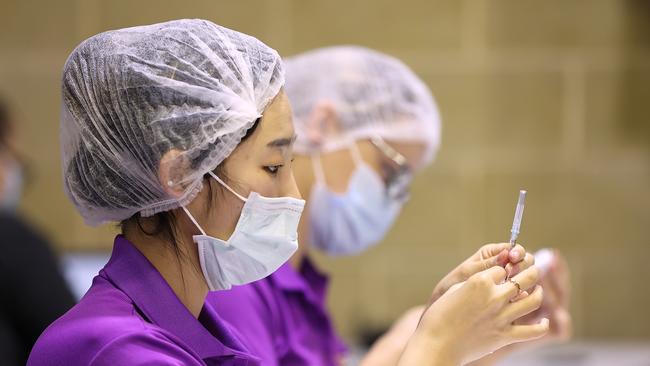Time to open up the Australian economy

Business obviously would like the disputes to be resolved but it has always been obvious that a day of reckoning between our security alliance and economic reliance would come.
Governments have naturally sought to avoid this but China’s growth, our economic reliance on it, and our place standing between the two global giants — China and the US — has hastened the arrival of that day.
Business would obviously prefer the differences be patched up but not at the cost of Australia forgoing our national interests.
On the security front, of course, the reality is things could also get worse, far worse, before they get better but that would only happen after negotiation, common sense and diplomacy fundamentally fail. Let us all work and use our links to ensure it does not come to that. You will hear no talk of “drums of war” from Australian business.
Beyond China, I want to bring a business perspective to some of the big challenges we face as we emerge into a new world — one in which a lot of what had sustained our success, especially migration and trade, has been undercut by the impact of COVID-19.
There is a one immediate issue to address. That is the vaccine rollout and the eventual reopening of the global economy and, most importantly, our own economy.
We need to be more ambitious about reopening our national border. We have derided other countries for wanting to build walls but we have managed to wall off Australia from the world and erect against ourselves the biggest trade barrier we have ever faced.
The unspoken reality is that we may win the health battle but lose the economic war if we keep our borders virtually hermetically sealed for another 12 months or more.
Whether we like it or not, we will have to deal with COVID-19 routinely in our community some time or another.
Britain is on the verge of a full reopening. Europe is heading that way and the US and Canada are not far behind. Talent, opportunities and investment will go there and to other open markets. They will not come here to buy at a closed shop.
Foreign students and their governments will not just sit around waiting for Australia to reopen while we debate whether it is OK to shake hands.
We simply cannot afford to sit in our gilded cage for much longer.
Businesses need to get their people overseas to meet customers and clients and seek new investments. True engagement and opportunity creation requires meeting people face to face.
From a global business perspective, there are a couple of core principles:
● There must an equitable rollout of safe and effective vaccines and there must be a complete rejection of vaccine protectionism or nationalism.
● There must be a coherent and consistent approach to vaccine technology and regulation and travel health credentials.
Whatever we do to facilitate travel and recognise vaccination (the vaccine passport) needs to be recognised and adopted globally. Let’s not get into a technology race or contest to be different, better or smarter. We need to work better together on the way out of COVID-19 than we did on the way in, where unilateral border closures and vaccine protectionism have unfortunately been far too prevalent.
On trade impacts, anything linked to international trade and investment and the movement of people across national borders continues to be stifled. Trade in goods is constrained by the lack of ships, containers and air freight. Businesses simply can’t get the goods they need here quickly enough, ranging from nuts and bolts to microchips and everything in between. This is holding up production.
Secondly, there is a serious discussion among industry globally on the role and suitability of our international institutions, especially the World Trade Organisation, to get trade back on track. As Australia’s representative to the G7 business talks I recently had a session with the new WTO Director General, Ngozi Okonjo-Iweala. She is full of hope and optimism, but the WTO is pretty close to a failed institution that needs a complete reboot to be fit for purpose.
We don’t need more trade rules, we have enough of them. We have rules to enforce contracts. We have rules to prevent export controls. But we need the rules to be enforced and we need an organisation with the credibility to do it. This will be a significant space to watch. Business frustration globally at the breakdown in trading rules and enforceability is reaching boiling point.
This is an opportunity for a reset — some would say a rebirth — of the operating environment that government and business work within.
At a time like this, we need more collaboration between government and business than ever before.
Innes Willox is CEO of the national employer association Ai Group and president of the Global Business Coalition.



There can be no serious economic or business discussion without mentioning the uncertainty being created by China’s actions to undercut our economic wellbeing.